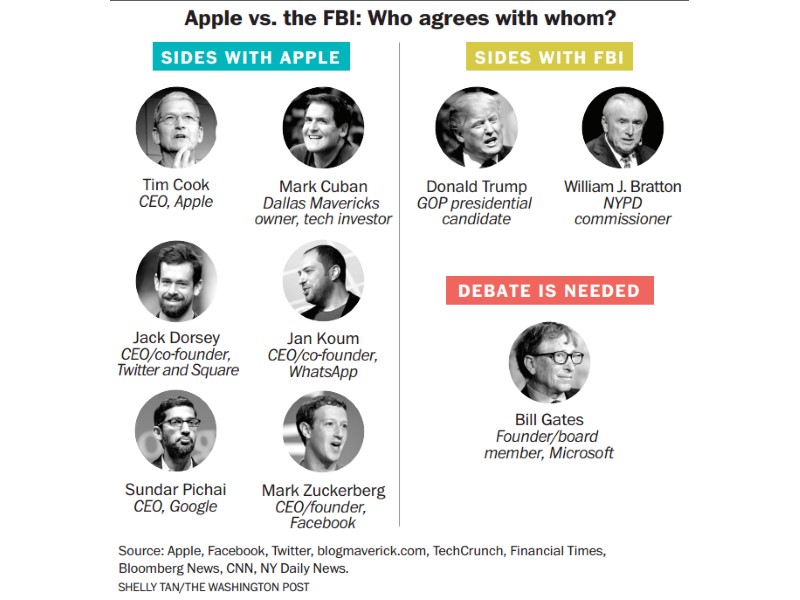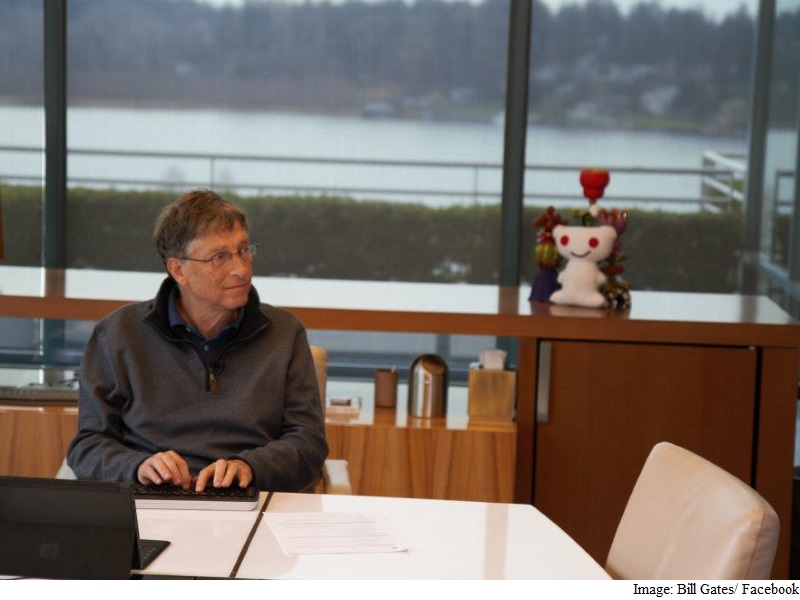Add Bill Gates to the cacophony of voices - from a former CIA director
to Donald Trump - weighing in on the debate that has erupted between
Apple and the
FBI over user privacy, security and the attempt to unlock a
phone used by one of the shooters in the San Bernardino, California,
terrorism attacks.
Early Tuesday, the Financial Times published an
interview with the Microsoft founder with a headline that said he sided
with the FBI. In it, Gates said that the government's request was "no
different" than getting access to bank or telephone records and seemed
to question Apple's position that complying with the order would be
precedent-setting.
"This is a specific case where the government
is asking for access to information," he said. "They're not asking for
some general thing - they are asking for a particular case."
Yet
shortly thereafter, Gates told Bloomberg News that he was "disappointed"
by how the piece was framed and said that more discussion is needed on
the issue. He said he thinks that it will be decided by the courts and
Congress but will require striking a balance.
"I do believe that
with the right safeguards, there are cases where the government, on our
behalf - like stopping terrorism, which could get worse in the future -
that that is valuable," he said.
Still, Gates's effort to search
for middle ground broke ranks with the more effusive support many tech
leaders have shown for Apple and its chief executive, Tim Cook.
"His
analogies to physical bank records in a vault really made it sound like
he thought Apple should comply," said Mark Bartholomew, a law professor
at SUNY-Buffalo who focuses on cybercrime. "I think he's still sounding
a very different, more cautious note from most of the others."

For
instance, Jack Dorsey, chief executive of Twitter and the mobile
payments company Square, tweeted: "We stand with @tim_cook and Apple
(and thank him for his leadership)!" Jan Koum, the co-founder of
WhatsApp, said on Facebook he "couldn't agree more with everything said
in [Apple's] Customer Letter. We must not allow this dangerous precedent
to be set. Today our freedom and our liberty is at stake."
In a
lengthy blog post, tech entrepreneur Mark Cuban gave Apple's decision to
oppose the government's order an "amen" and "a standing ovation,"
suggesting that a law is needed to clear up confusion on the issue.
There
appears to be an effort to mobilize public opinion before it becomes
hardened by the political debates that are sure to take off. "A lot of
this is an attempt to very publicly tell the consumer, 'Look: We're on
the front lines trying to defend your privacy,' " he said.
Other
CEOs were careful to note their allegiance to helping the government
while expressing support for Apple. Facebook's Mark Zuckerberg noted
that the company feels it has a responsibility to help the government
when there are opportunities to help prevent terrorist attacks and will
take them. But, he said, "we're sympathetic with Apple on this one" and
added, "I don't think requiring backdoors into encryption is either
going to be an effective way to increase security or is really the right
thing to do for just the direction that the world is going in."
In
a series of tweets, Google CEO Sundar Pichai called Cook's open letter
"important," saying that "forcing companies to enable hacking could
compromise users' privacy." He added that law enforcement faces
challenges and that Google gives access when there are "valid legal
orders" but notes "that's wholly different than requiring companies to
enable hacking of customer devices & data. Could be a troubling
precedent."
Tech companies also have more to lose than other
industries if their reputation on the issue suffers. Paul Argenti, a
professor at Dartmouth's Tuck School of Business who studies corporate
communications, notes that the tech industry ranks highest among its
peers in the Edelman Trust Barometer, a global survey of consumer
opinion. As a result, he said, it has more to protect by speaking out.
"Along with that trust," he says, "comes an obligation to weigh in on an
issue of this magnitude."
There could still be others who add
their voices to the chorus. Says Bartholomew: "It's easier to take a
position now that Tim Cook has," he said. "He's a very well-known CEO,
and so I think his face out there provides a certain amount of cover.
Once Apple makes a stand, it's easier for other companies to join up."
© 2016 The Washington Post
For the latest tech news and reviews, follow Gadgets 360 on X, Facebook, WhatsApp, Threads and Google News. For the latest videos on gadgets and tech, subscribe to our YouTube channel. If you want to know everything about top influencers, follow our in-house Who'sThat360 on Instagram and YouTube.
Further reading:
Apple,
Bill Gates,
Encryption,
FBI,
Jack Dorsey,
Mark Zuckerberg,
Mobiles,
NSA,
Silicon Valley,
Tim Cook,
Twitter,
US,
WhatsApp,
iPhone
 Google Play Store Blocks 17 Unregistered Crypto Exchanges in South Korea, Apple May Follow27 March 2025
Google Play Store Blocks 17 Unregistered Crypto Exchanges in South Korea, Apple May Follow27 March 2025 iPhone 17 Series to Reportedly Get 8K Video Recording Support27 March 2025
iPhone 17 Series to Reportedly Get 8K Video Recording Support27 March 2025 Apple iPhone 16e Review: When You Just Need an iPhone27 March 2025
Apple iPhone 16e Review: When You Just Need an iPhone27 March 2025 Apple Appoints Global Head for Its Retail Stores in Latest Management Shift27 March 2025
Apple Appoints Global Head for Its Retail Stores in Latest Management Shift27 March 2025 iPhone 17 Air Thinness Compared With iPhone 17 Pro in Leaked Image26 March 2025
iPhone 17 Air Thinness Compared With iPhone 17 Pro in Leaked Image26 March 2025


![Gadgets 360 With Technical Guruji: Ask TG [ March 22, 2025]](https://c.ndtvimg.com/2024-12/5s52e4k_-ask-tg_640x480_14_December_24.jpg?downsize=180:*)












